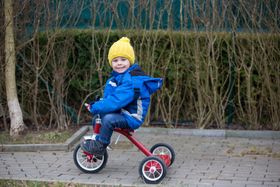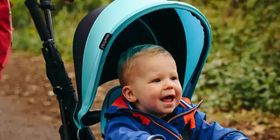Please choose a market from our global website network for local availability and information.
Choose country

Free NEXT DAY delivery on orders over £50 (before 1pm)
Join over 20M+ happy families
Is your baby a late walker or an early talker? Discover the fascinating journey of your child's first milestones.
Published June 6, 2023
Navigating your baby's first milestones can be both thrilling and nerve-racking. It feels like just yesterday you were cradling a newborn, and now your home is a flurry of activity as your baby starts to explore their surroundings. Whether it's those adorable first attempts to crawl or the delightful babbling sounds, these milestones mark a crucial stage in your baby's life.
Typically, babies start taking their first independent steps between 9 and 16 months. By their first birthday, many can stand unaided, embarking on their journey of independent exploration. Of course, there are always exceptions, with some babies beginning to toddle around a little later than the average, and that's perfectly normal. Each child is unique and will progress at their own pace.
While the exploration of the physical world often takes precedence, verbal communication is not far behind. By the age of one, it's common for babies to have a small arsenal of meaningful words at their disposal, such as "Mum", "Dad", "Baba", "bi-bi", or similar. As they grow older and reach 18 months, many will start forming simple sentences and requests, becoming increasingly vocal about their desires and emotions.
Do Early Walkers Talk Later?
While babies typically start walking before talking, the two skills develop independently. There's no scientific evidence suggesting a correlation between early walkers and later talkers, or vice versa.
It's easy to find yourself comparing your child's progress to others, but remember: each baby is unique. Their abilities in walking and talking largely depend on individual characteristics and preferences. What's considered 'late' in some circles might be perfectly normal for your child.
However, if by the age of three, your child is still only speaking in individual syllables or is unable to string words into simple phrases, it may be worth consulting a professional. Similarly, if they're struggling with mobility, a visit to a paediatric neurologist could be helpful. Remember, it's okay to seek advice when you have concerns. As a parent, you're doing a wonderful job by paying close attention to your child's developmental journey.
» Learn more about gross motor skills in child development
Whether your baby is a quick crawler, a late walker, or a chatterbox, these initial years are full of magical milestones that are uniquely theirs. Embrace them, encourage them, and remember that your baby is exactly where they need to be in their development. You are their greatest cheerleader in this beautiful journey of growth and discovery.

Tatiana Kopyrina
April 4, 2023

Tatiana Kopyrina
September 12, 2023

George Croft
September 12, 2023

Jaya Narinesingh
July 17, 2023

Jaya Narinesingh
September 11, 2023
Ruchita Dhavade
Tatiana Kopyrina
Malika Yuldasheva
Asmar Karimli